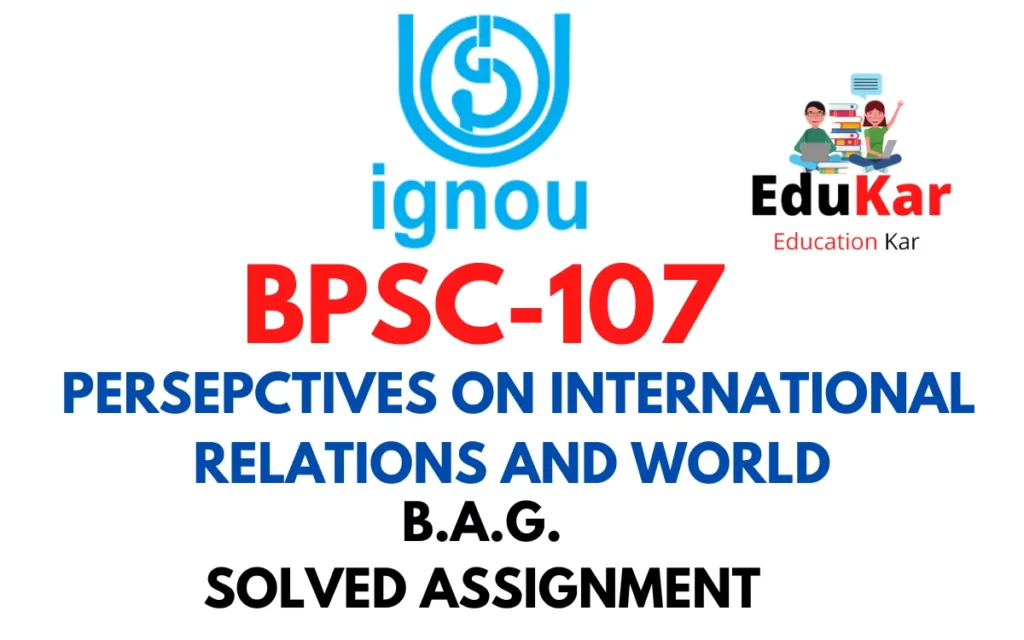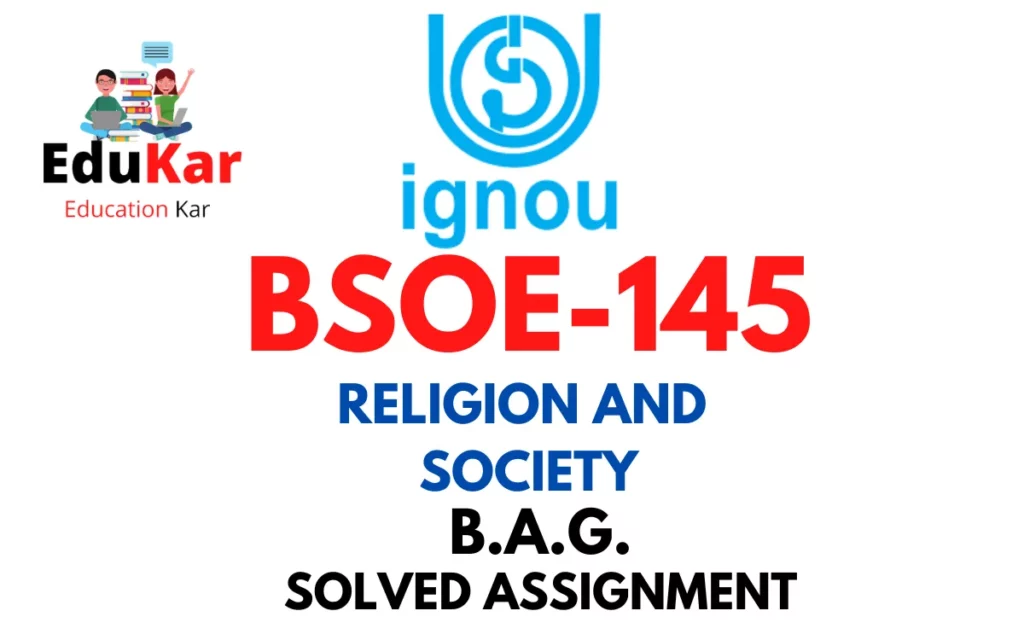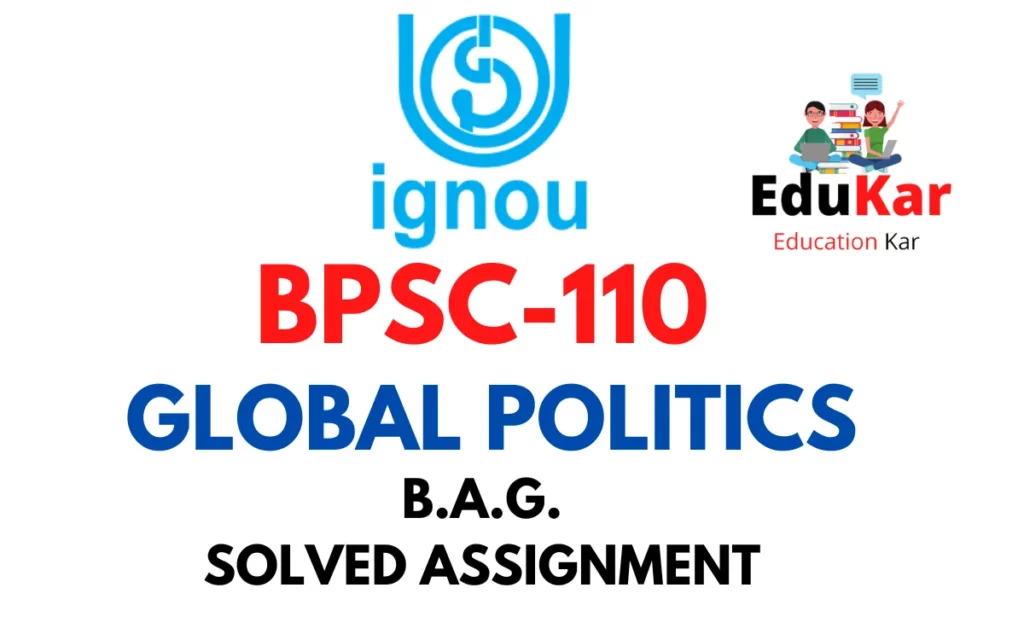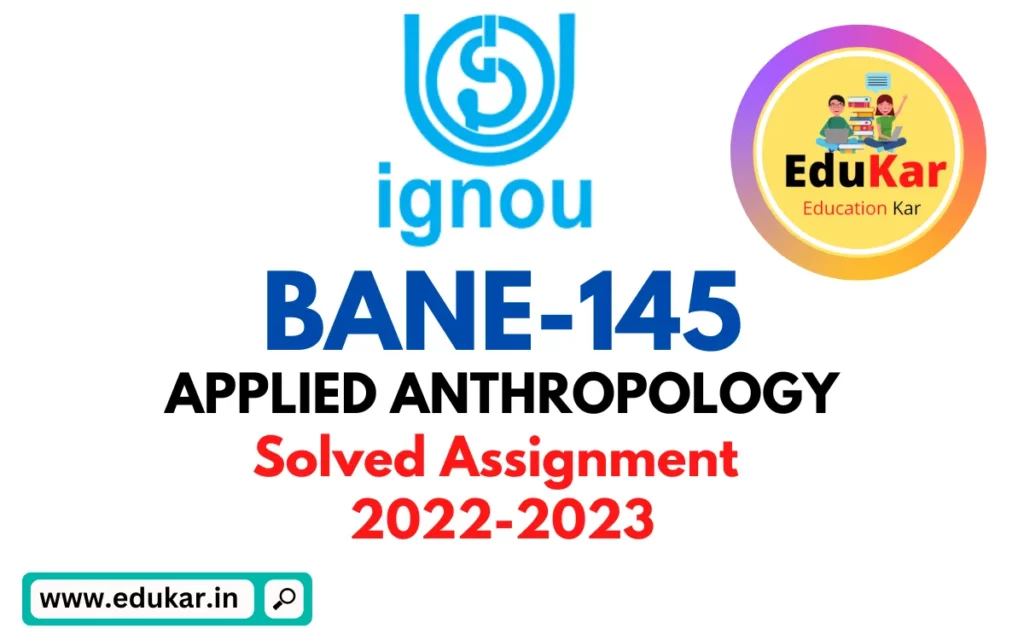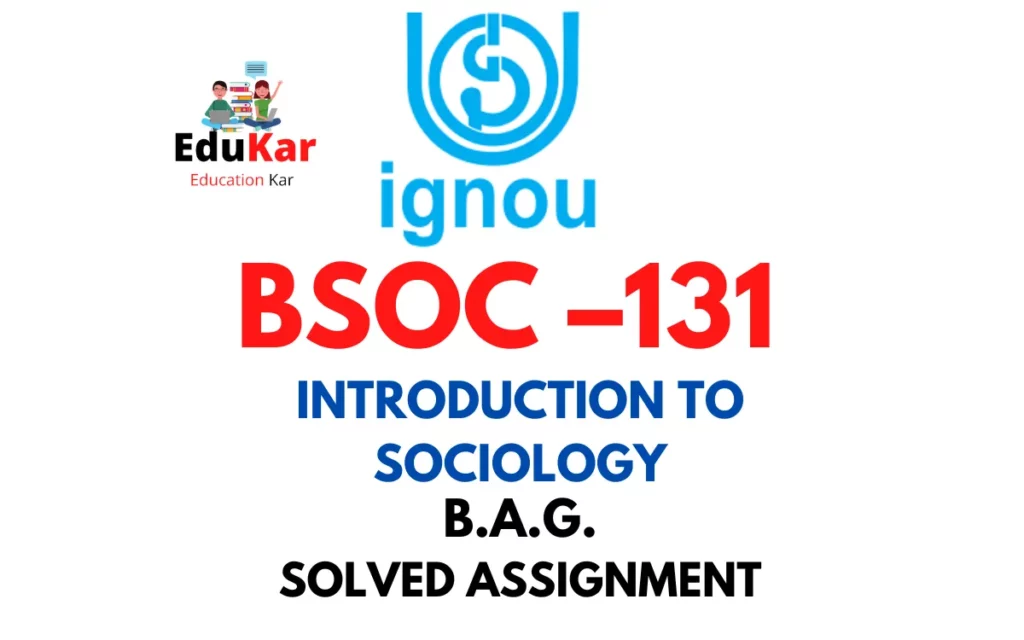Contents
- 1 Assignment – I
- 2 Answer the following in about 500 words each.
- 3 1.Examine the causes of World War –I and its impact for Europe.
- 4 2. Explain different theoretical approaches of international relations.
- 5 Assignment – II
- 6 Answer the following questions in about 250 words each.
- 7 3. Define Collective security and the purpose of UN collective security approach.
- 8 4. Describe the factors responsible for World War –II.
- 9 5. Methods of securing national interests in world politics.
- 10 Assignment – III
- 11 Answer the following questions in about 100 words each.
- 12 6. Critical theories of International Relations.
- 13 7. International anarchy and world politics.
- 14 8. Describe Green Politics.
- 15 9. Describe Treaty of Versailles
- 16 10. Regionalism and New Regionalism
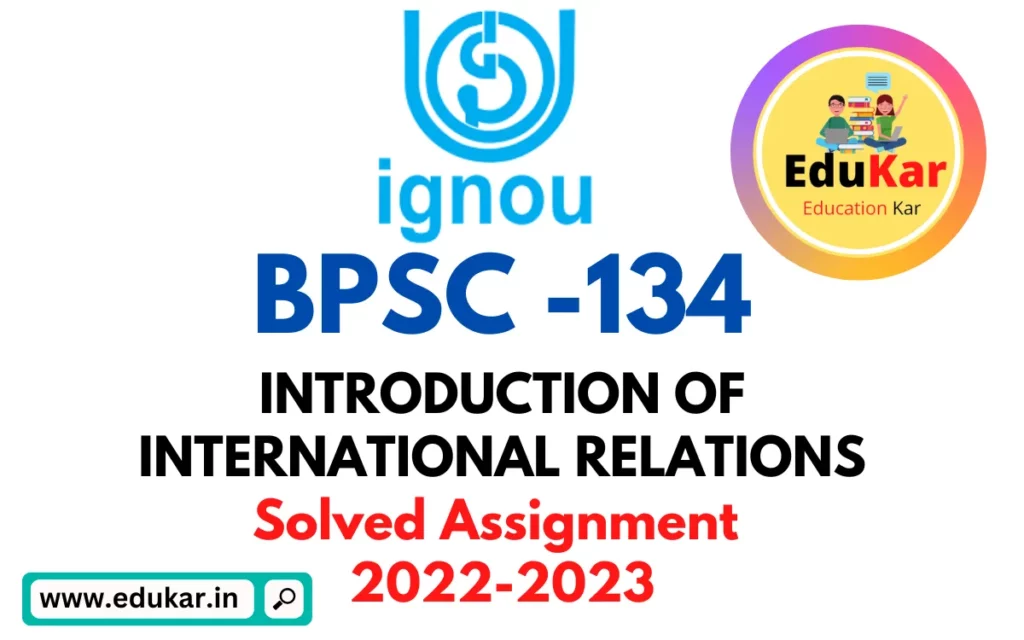
| Title | BPSC-134: IGNOU BAG Solved Assignment 2022-2023 (INTRODUCTION OF INTERNATIONAL RELATIONS) |
| University | IGNOU |
| Degree | Bachelor Degree Programme |
| Course Code | BPSC-134 |
| Course Name | INTRODUCTION OF INTERNATIONAL RELATIONS |
| Programme Name | Bachelor of Arts (General) |
| Programme Code | BAG |
| Total Marks | 100 |
| Year | 2022-2023 |
| Language | English |
| Assignment Code | BPSC-134/ASST/TMA/2022-23 |
| Last Date for Submission of Assignment: | For June Examination: 31st April For December Examination: 30th September |
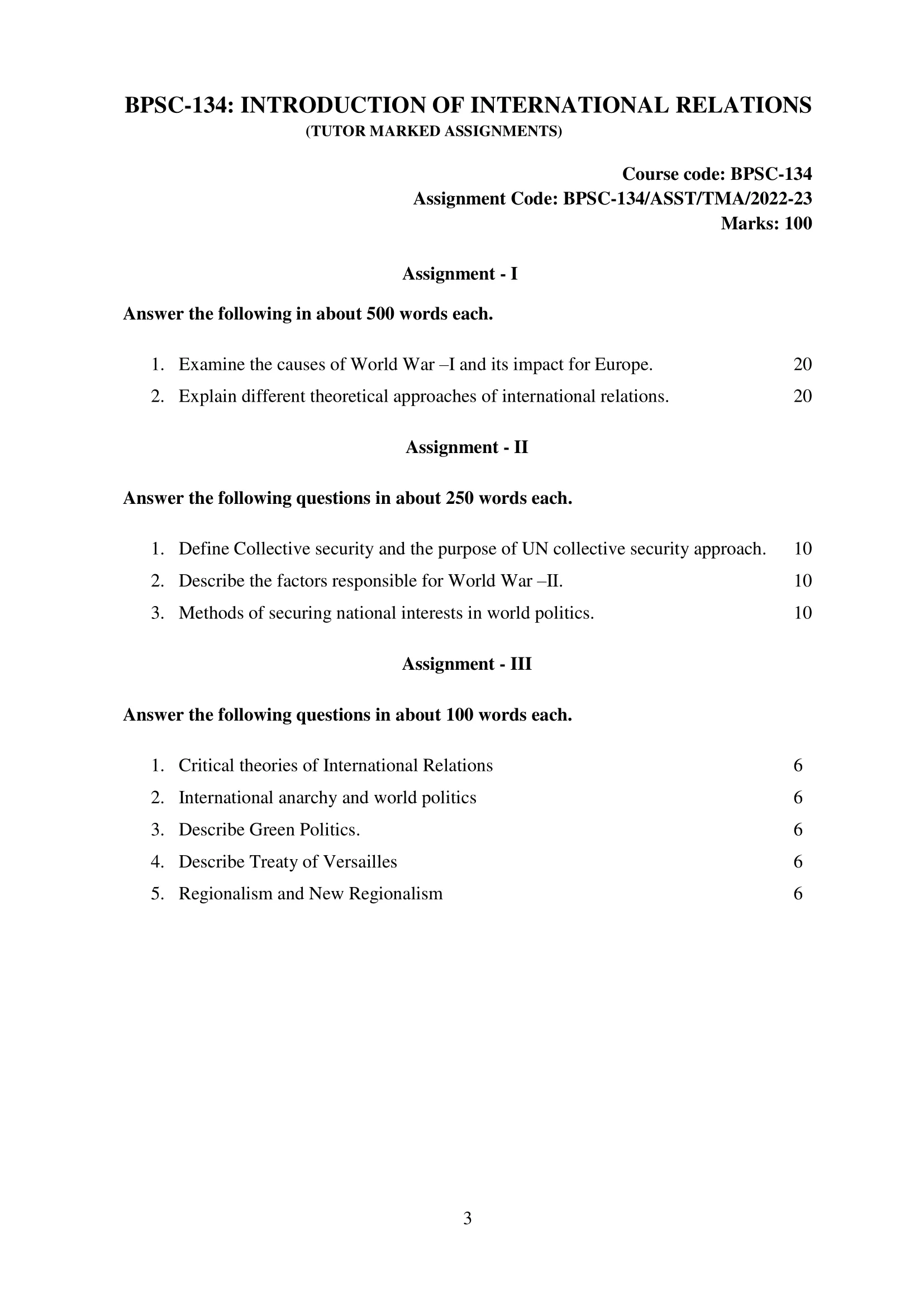
Assignment – I
Answer the following in about 500 words each.
1.Examine the causes of World War –I and its impact for Europe.
Ans: The causes of World War I are complex and include long-term, short-term, and trigger events. The long-term causes include imperialism, nationalism, and the growing military power of nations. Imperialism, the competition for colonies and economic power, created tensions among the European nations. Nationalism, the devotion to one’s country and culture, created intense rivalries between the various ethnic groups in Europe. The growing military power of nations, as evidenced by the arms race between Germany, Britain, and France, created a sense of insecurity among the nations and an increased likelihood of conflict.
Short-term causes of World War I included the assassination of Archduke Franz Ferdinand of Austria-Hungary by a Serbian nationalist in 1914, which led to the declaration of war between Austria-Hungary and Serbia, and the subsequent involvement of other nations through their military alliances. The system of alliances and the fear of being isolated or encircled by hostile powers were also contributing factors to the outbreak of war.
The trigger event of World War I was the mobilization of armies and the declaration of war between Germany and Russia on August 4, 1914. Germany, Austria-Hungary, and the Ottoman Empire (Central Powers) fought against the Allied Powers, which included France, Russia, and Britain. The war lasted until 1918 and resulted in the defeat of the Central Powers.
The impact of World War I on Europe was significant. The war resulted in the loss of millions of lives, physical destruction, and economic devastation. The Treaty of Versailles, which ended the war, imposed severe penalties on Germany, including war reparations and territorial losses, which led to economic hardship and the rise of extremism in Germany. The war also led to the collapse of four empires, the Ottoman, Austro-Hungarian, German, and Russian, and the emergence of new states in Europe.
The war had a profound impact on Europe’s political and social structure. The Russian Revolution of 1917 resulted in the establishment of the Soviet Union, which would go on to become a major world power. The rise of totalitarian regimes in Europe, such as Nazi Germany and Fascist Italy, and the disillusionment with the traditional political systems in Europe, contributed to the rise of nationalism, fascism, and communism in the region.
2. Explain different theoretical approaches of international relations.
Ans: International Relations (IR) is a discipline that studies the interactions and relationships among states and other actors in the international system. Over the years, various theoretical approaches have emerged to explain and analyze these relationships. The following are the main theoretical approaches in IR:
- Realism: Realism is a dominant theoretical approach in IR that emphasizes the role of power and self-interest in shaping the behavior of states and other actors in the international system. According to realists, states are the primary actors in the international system and they pursue their own self-interest through the accumulation of power. Realists also believe that the international system is anarchic, meaning that there is no central authority that can enforce rules and regulations, and that states must therefore rely on their own military and economic power to ensure their survival and security.
- Liberalism: Liberalism is an approach that emphasizes the role of international institutions and cooperation in promoting peace, stability, and prosperity in the international system. According to liberals, states can work together to achieve common goals and overcome the limitations of the anarchic international system. They believe that states can cooperate through international institutions, such as the United Nations, the World Trade Organization, and the International Monetary Fund, to promote mutual gains and solve global problems.
- Constructivism: Constructivism is a theoretical approach that focuses on the role of norms, ideas, and beliefs in shaping state behavior and the structure of the international system. Constructivists argue that state behavior is not solely determined by material interests, but also by the ideas and norms that they hold. They believe that international norms and institutions play a crucial role in shaping state behavior and that states can cooperate and work together to achieve common goals.
- Marxism: Marxism is an approach that emphasizes the role of economic and class factors in shaping the behavior of states and other actors in the international system. According to Marxist theory, the international system is characterized by a struggle between the ruling class and the working class, and that states pursue their interests based on their position in this struggle. Marxist theorists believe that the international system is characterized by imperialism and exploitation, and that states must cooperate to overcome these challenges.
- Feminism: Feminism is an approach that emphasizes the role of gender and gender-based power relations in shaping the behavior of states and other actors in the international system. Feminist theorists argue that the international system is patriarchal, meaning that it is dominated by men and male interests, and that this has significant consequences for the position and experiences of women in the international system. Feminist theorists also believe that states must work together to address gender-based inequalities and to promote gender equality in the international system.
Assignment – II
Answer the following questions in about 250 words each.
3. Define Collective security and the purpose of UN collective security approach.
Ans: Collective security refers to a concept in international relations in which a group of nations work together to ensure the peace and security of all member states. The idea behind collective security is that an attack on one nation is considered an attack on all nations and that all members must come together to respond to the aggression. This approach aims to promote stability, reduce tensions, and prevent conflicts between nations by establishing a system of collective defense and promoting international cooperation.
The United Nations (UN) is one of the key international organizations that has adopted the collective security approach. The purpose of the UN collective security approach is to maintain international peace and security through a system of collective action. The UN Charter, which was signed in 1945, lays down the principles of collective security, including the use of peaceful means, the settlement of international disputes through negotiation, and the use of force as a last resort.
The UN collective security approach has been used in various conflicts around the world, including the Gulf War and the conflict in the Balkans. In these cases, the UN has acted as a mediator, bringing together the conflicting parties to negotiate a peaceful resolution. The UN has also deployed peacekeeping forces to troubled regions, with the goal of maintaining stability and promoting peace.
In addition, the UN has adopted a number of initiatives aimed at strengthening the collective security approach, including the creation of the International Criminal Court, the development of an international arms control regime, and the establishment of an international humanitarian law. These initiatives are aimed at promoting accountability, reducing tensions, and preventing the spread of conflict.
4. Describe the factors responsible for World War –II.
Ans: World War II was a global conflict that lasted from 1939 to 1945 and involved the majority of the world’s nations, including all of the great powers. The war was the deadliest conflict in human history, resulting in an estimated 50 million fatalities. There are a number of factors that contributed to the outbreak of World War II, including:
- The Treaty of Versailles: The Treaty of Versailles was signed at the end of World War I and imposed severe penalties on Germany. The harsh treatment of Germany resulted in the rise of nationalism and resentment, which contributed to the rise of the Nazi party and the eventual outbreak of World War II.
- The Great Depression: The Great Depression, which began in 1929, had a profound impact on the global economy and led to high levels of unemployment and poverty. The economic crisis created an environment in which extremist ideologies, such as fascism and communism, were able to gain a foothold.
- The rise of totalitarian regimes: The rise of totalitarian regimes in Italy, Japan, and Germany played a significant role in the outbreak of World War II. These regimes were characterized by a focus on military expansion, aggressive foreign policies, and disregard for the rights and freedoms of their citizens.
- The failure of appeasement: The policy of appeasement, which was pursued by the British and French governments in the 1930s, allowed Nazi Germany to expand its territory and military power without facing significant resistance. This failure to act led to a situation in which Germany was able to launch a full-scale invasion of Poland, which marked the beginning of World War II.
- The German-Soviet Pact: The German-Soviet Pact, signed in 1939, was a non-aggression agreement between Germany and the Soviet Union that allowed Hitler to focus his military efforts on Western Europe. The pact helped to create a power vacuum in Eastern Europe, which was eventually filled by the Soviet Union after the German invasion of Poland.
5. Methods of securing national interests in world politics.
Ans: In world politics, nations aim to secure their national interests through a variety of methods. Some of the most common methods used to secure national interests include:
- Diplomacy: Diplomacy refers to the use of negotiations, treaties, and agreements between nations to resolve conflicts and promote cooperation. Diplomacy is often used to secure national interests by promoting peace and stability, improving economic relations, and resolving disputes.
- Military force: Military force is sometimes used by nations to secure their national interests, particularly in situations where diplomacy has failed. The use of military force is often a last resort, as it can lead to significant harm and destruction, and can have long-lasting consequences.
- Economic means: Economic means, such as trade and investment, are often used to secure national interests. For example, a nation may seek to secure its energy supplies by investing in foreign oil fields, or may promote its national interests by signing trade agreements with other nations.
- Intelligence gathering: Intelligence gathering is the process of collecting information to inform foreign policy decisions. By gathering information about the actions and intentions of other nations, a nation can better protect its national interests.
- Alliances: Alliances are partnerships between nations that are formed for the purpose of securing national interests. Alliances can take many forms, including military alliances, economic partnerships, and political agreements.
- Multilateral institutions: Multilateral institutions, such as the United Nations and the World Trade Organization, can be used to secure national interests by promoting cooperation and resolving conflicts between nations.
Assignment – III
Answer the following questions in about 100 words each.
6. Critical theories of International Relations.
Ans: Critical theories of International Relations (IR) challenge the traditional, mainstream approaches and instead focus on the power dynamics, inequalities, and oppressions that exist in the international system. These theories include Marxist, feminist, postcolonial, and postmodernist perspectives, among others. They argue that the international system is structured by relationships of domination and subordination, where certain states and actors have more power and influence than others. These critical theories also question the idea of an objective, neutral IR discipline and instead emphasize the role of ideology and power in shaping the way we understand and analyze the world. These theories offer a more nuanced and critical perspective on the international system, highlighting the need for more equitable and just relationships among states and other actors.
7. International anarchy and world politics.
Ans: International anarchy refers to the lack of a central authority or governing body in the international system. This means that there is no universal or enforceable set of rules or laws that regulate the behavior of states and other actors in the international system. As a result, states must rely on their own power and self-help to ensure their security and advance their interests. This reality shapes the nature of world politics, as states compete for power and influence, form alliances, and engage in conflict to pursue their interests. International anarchy therefore creates a situation of ongoing tension and insecurity, as states must navigate a constantly shifting landscape of power relations and competing interests. However, despite the lack of a central authority, international institutions, norms, and agreements can help to regulate state behavior and mitigate the effects of international anarchy in world politics.
8. Describe Green Politics.
Ans: Green politics is a political ideology that aims to promote environmental sustainability and social justice. Green politics advocates for policies that address environmental problems, such as climate change, deforestation, and pollution, while also addressing social and economic issues, such as poverty, inequality, and access to resources. Green politics sees environmental and social issues as interconnected, and it recognizes that sustainable development requires a balance between economic, social, and environmental considerations.
Green politics emphasizes the importance of decentralized decision-making, community involvement, and respect for nature. It supports renewable energy sources, energy efficiency, and environmentally friendly transportation, and it opposes the exploitation of natural resources for short-term economic gain. Green politics also advocates for the protection of biodiversity and the rights of future generations.
Green politics has gained increasing importance in recent years, as concerns about the impacts of human activities on the environment have become more widespread. Green political parties and movements have gained significant political representation in many countries, and green issues have become an important part of the political discourse in many societies.
9. Describe Treaty of Versailles
Ans: The Treaty of Versailles was a peace treaty signed in 1919 after World War I, between the Allied powers and Germany. The treaty was intended to bring an end to the conflict and to establish the terms for peace. It imposed severe penalties on Germany, including disarmament, territorial losses, and reparations payments. The Treaty of Versailles was seen by many as excessively harsh and it was widely criticized for its impact on Germany, which contributed to the rise of nationalist sentiment and the eventual outbreak of World War II.
The Treaty of Versailles also established the League of Nations, an international organization designed to promote peace and prevent future wars. Although the League of Nations was intended to be an effective tool for promoting peace, it was ultimately unable to prevent the outbreak of World War II, and it was disbanded in the aftermath of the conflict. Despite its limitations, the Treaty of Versailles remains a significant milestone in the history of international relations, and it continues to shape the world in which we live today.
10. Regionalism and New Regionalism
Ans: Regionalism refers to the cooperation and integration between countries within a specific geographical region. It aims to promote peace, stability, and prosperity within the region through the creation of common institutions, policies, and initiatives. The concept of regionalism has evolved over time, and the term “New Regionalism” refers to a more recent and broader approach to regional cooperation that emerged in the late 20th century.
New Regionalism places greater emphasis on interdependence, institutionalization, and the role of non-state actors, such as civil society and the private sector. It recognizes that global challenges, such as climate change, cross-border trade, and terrorism, cannot be effectively addressed by individual nations acting alone, and that cooperation at the regional level is necessary to address these challenges. New Regionalism has also led to the creation of new regional organizations, such as the African Union, the European Union, and the Association of Southeast Asian Nations (ASEAN), which have played a significant role in promoting regional cooperation and integration.
How to Download BPSC-134 Solved Assignment?
You can download it from the www.edukar.in, they have a big database for all the IGNOU solved assignments.
Is the BPSC-134 Solved Assignment Free?
Yes this is absolutely free to download the solved assignment from www.edukar.in
What is the last submission date for BPSC-134 Assignment?
For June Examination: 31st April, For December Examination: 30th October

